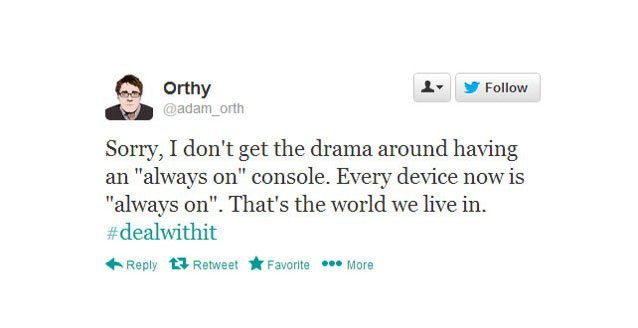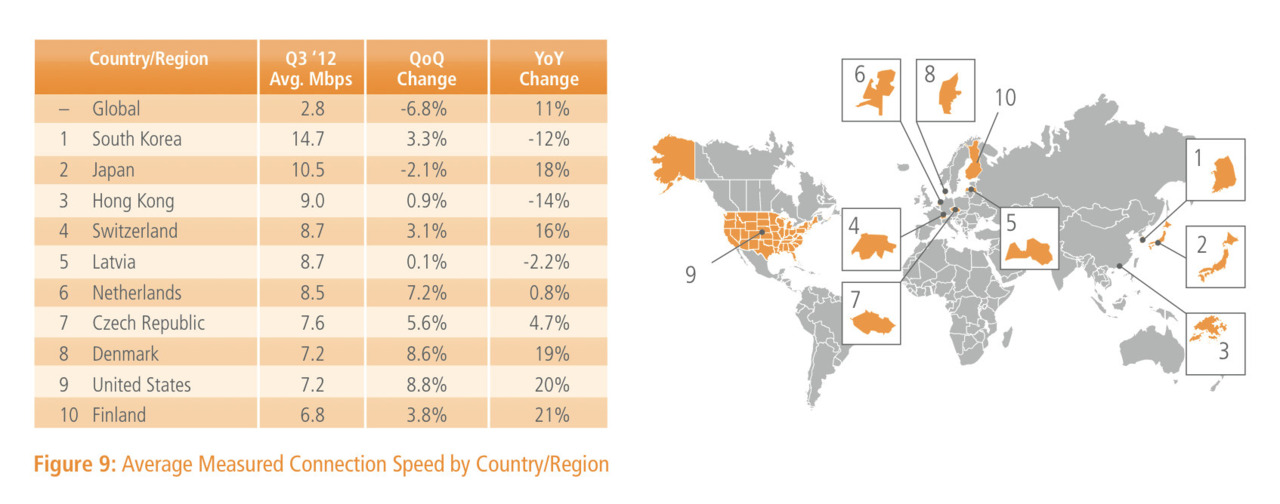Xbox 720: Will always-on switch gamers off?
The rumours all point towards the next Xbox requiring an internet connection to play games, but is the technology or the need there to support it?
It was just last week that Microsoft's Adam Orth took to the internet and told gamers around the world to just "#dealwithit" when it comes to games consoles requiring an always-on internet connection. And while Orth may have his own personal reasons for making such a statement, the fact remains that this was a senior Microsoft employee treating complaints about DRM with contempt. No matter how much Microsoft wants to release an always-on console, it's clear from the internet backlash they don't want such a device: bullying them into it isn't going to work.
At the time of publication there are over 16,000 comments on GameSpot's Orth story, most of them negative. After all, what reason would gamers have to be positive about it? Persistent online games are often released to disastrous results. EA's SimCity launched with a string of server problems that meant players couldn't play a game--single-player or otherwise--without huge waits or restrictions on content. Diablo III's login server buckled under the pressure at launch, with thousands of paying customers unable to play the game.
The issue hasn't just affected PC games either. EA's Battlefield 1943, while not an always-online game as such, launched on Xbox 360 with a multitude of connection problems that took weeks to be resolved. And that's just individual games. If every new Xbox has to be online to play games, there could be potentially millions upon millions of people connecting to its servers at once, which could cause all manner of issues. It's not an impossible task to manage--after all, YouTube does just fine--but unless large investments in infrastructure are made early on, there are going to be problems.
There's more to it than just what Microsoft has to manage from its end, though. The consumer broadband market has its own share of issues, if you can get broadband at all. The latest FCC broadband progress report shows that 37 percent of Americans, 119 million people in all, don't have broadband (defined as 4Mbps down and 1Mbps up) internet. 10 million of that is made up of citizens who don't have access to broadband, while the other 100 million live in areas where broadband is available but do not subscribe.
The situation in the UK is a little better--but only just. The latest report from the Office for National Statistics puts internet access in the UK at 21 million households, or around 80 percent of the population. Of those 21 million, 93 percent are connected via broadband, leaving the remaining 7 percent languishing on dialup connections. Clearly then, there's a significant proportion of people across two of the Xbox's biggest markets that don't have an internet connection suitable for an always-online console.
Of course, not all those broadband holdouts are current, or even potential Xbox customers. In the UK at least, of those who did not have broadband, the vast majority said the reason they didn't subscribe was that they "simply did not need it", as opposed to factors like cost or access. It's less likely that group of people who don't need broadband are in the market for the latest and greatest piece of connected gaming technology.
Even if you have broadband access, what if your internet goes down? Orth likened it to the electricity going out, or not having any mobile phone signal, and in some respects he's right. But that overlooks the fundamental question of why I, as a gamer, want to have my console connected to the internet 24/7 just to play a game. I want to be connected to the electricity grid so I can power the devices in my home. I want to be connected to the mobile network so I can keep in touch friends and family. What compelling reason could there be for the new Xbox to always require an internet connection?
Social features? Auto-updates? That's not enough. Perhaps it will make it easier for developers to implement new features if they know that every console is connected to the internet--but that, too, doesn't seem like enough. The only compelling consumer-facing reason I can think of is that Microsoft is going big on cloud gaming. AMD, the company rumored to be powering the next Xbox, recently made a big push into the cloud with its Radeon Sky series of GPUs that are specifically intended for streaming services. Nvidia has its similar GRID technology. Whether the next Xbox is limited to streaming games like the PS4, or it offloads some of its processing tasks, the cloud represents the one area that could convince consumers to remain online.
What compelling reason could there be for the new Xbox to always require an internet connection?
Of course, there are other reasons why Microsoft would want you to be connected internet 24/7, outside of consumer facing features. Imagine the amount of data it could capture if it knew what games you were playing, at what hours of the day, and for how long. That's extremely valuable information that could be used to improve its products, or--if we're going down the cynical route--offer up more targeted advertising on the Xbox Dashboard. But the biggest and most controversial theory behind an always-on console is that it will block used game sales.
The rumors around the blocking of used games have been circulating ever since the Durango codename was revealed last year. But the fresh reports of the next Xbox requiring an internet connection have backed up those rumours. And from a pure business perspective, it makes sense. Microsoft, publishers, and developers don't receive any revenue from the sale of used games, with it instead going straight into the pockets of the retailer. Take used games out of the equation and, in theory, revenue goes up.
The trouble is, having to check in with an authentication server to play a game is incredibly irritating and prone to problems: just ask anyone who had to deal with Ubisoft's now defunct online-DRM service for PC games. Getting booted out of a game just because the internet has gone down is not going to win Microsoft customers.
Hell, even the Wii U is a better proposition at this point.
And those customers have more choice than ever when it comes to games consoles. They may flock to Sony's PS4, which is unlikely to block used games. Or they could jump ship to one of the many upcoming Android-based consoles like Ouya. Hell, even the Wii U is a better proposition at this point. It's going to take either a very strong launch lineup, or some cheap Steam-like pricing to convince consumers that Microsoft's heavy-handed copy protection is OK, and even then, it's going to be still going to be a tough sell.
The fact is, neither the technology or the consumers that use it are ready for the likes of an always-on console. Ignoring the practicalities of the situation and telling people to just "deal with it" smacks of a company that has lost touch with what its consumers want or need. Here's hoping Microsoft puts our fears to rest at its rumoured event on May 21.
'Got a news tip or want to contact us directly? Email news@gamespot.com


Join the conversation